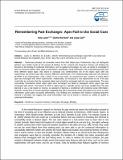Files in this item
Remembering past exchanges : apes fail to use social cues
Item metadata
| dc.contributor.author | Lewis, Amy | |
| dc.contributor.author | Bernsten, Dorthe | |
| dc.contributor.author | Call, Josep | |
| dc.date.accessioned | 2018-02-15T17:30:14Z | |
| dc.date.available | 2018-02-15T17:30:14Z | |
| dc.date.issued | 2018-02-01 | |
| dc.identifier | 252076489 | |
| dc.identifier | 3004c7f7-ec81-45dc-ad5f-208423300b79 | |
| dc.identifier.citation | Lewis , A , Bernsten , D & Call , J 2018 , ' Remembering past exchanges : apes fail to use social cues ' , Animal Behavior and Cognition , vol. 5 , no. 1 , pp. 19-40 . https://doi.org/10.26451/abc.05.01.03.2018 | en |
| dc.identifier.issn | 2372-5052 | |
| dc.identifier.other | ORCID: /0000-0002-8597-8336/work/41757185 | |
| dc.identifier.other | ORCID: /0000-0001-8616-2411/work/41757187 | |
| dc.identifier.uri | https://hdl.handle.net/10023/12728 | |
| dc.description | The authors thank the Danish National Research Foundation [DNRF89] for funding. | en |
| dc.description.abstract | Nonhuman primates can remember events from their distant past. Furthermore, they can distinguish between very similar events by the process of binding. So far, research into long-term memory and binding has focused on the binding of contextual information, such as spatial surroundings. As such, we aimed to investigate if apes can bind and retrieve other types of information, specifically, social information. We presented great apes with three different object types; they learnt to exchange (via reinforcement) one of the object types with one experimenter and another type with a second, different, experimenter. The remaining object type was not reinforced by either of the experimenters. After a delay of two or ten weeks, we assessed the apes’ memory of which object type was exchanged with which experimenter. Additionally, we introduced a new experimenter to see if the apes could infer by exclusion that the remaining object type should be exchanged with the new experimenter. The apes successfully remembered which object types were exchanged, but failed to distinguish which object type was exchanged with whom. This failure to bind an object type to a specific person may have resulted from the apes learning to use a rule based on recency, as opposed to learning a conditional rule involving social information. However, results from a second experiment suggested they fail to incorporate social information even when no other information could guide successful performance. Our findings are consistent with research showing long-term memory in primates, but suggest that social information may not be bound in memory as readily as spatial or contextual information. | |
| dc.format.extent | 1254647 | |
| dc.language.iso | eng | |
| dc.relation.ispartof | Animal Behavior and Cognition | en |
| dc.subject | Social cue | en |
| dc.subject | Long-term memory | en |
| dc.subject | Great apes | en |
| dc.subject | Exchange | en |
| dc.subject | Binding | en |
| dc.subject | BF Psychology | en |
| dc.subject | QL Zoology | en |
| dc.subject | NDAS | en |
| dc.subject.lcc | BF | en |
| dc.subject.lcc | QL | en |
| dc.title | Remembering past exchanges : apes fail to use social cues | en |
| dc.type | Journal article | en |
| dc.contributor.institution | University of St Andrews. School of Psychology and Neuroscience | en |
| dc.contributor.institution | University of St Andrews. Centre for Social Learning & Cognitive Evolution | en |
| dc.identifier.doi | 10.26451/abc.05.01.03.2018 | |
| dc.description.status | Peer reviewed | en |
This item appears in the following Collection(s)
Items in the St Andrews Research Repository are protected by copyright, with all rights reserved, unless otherwise indicated.

